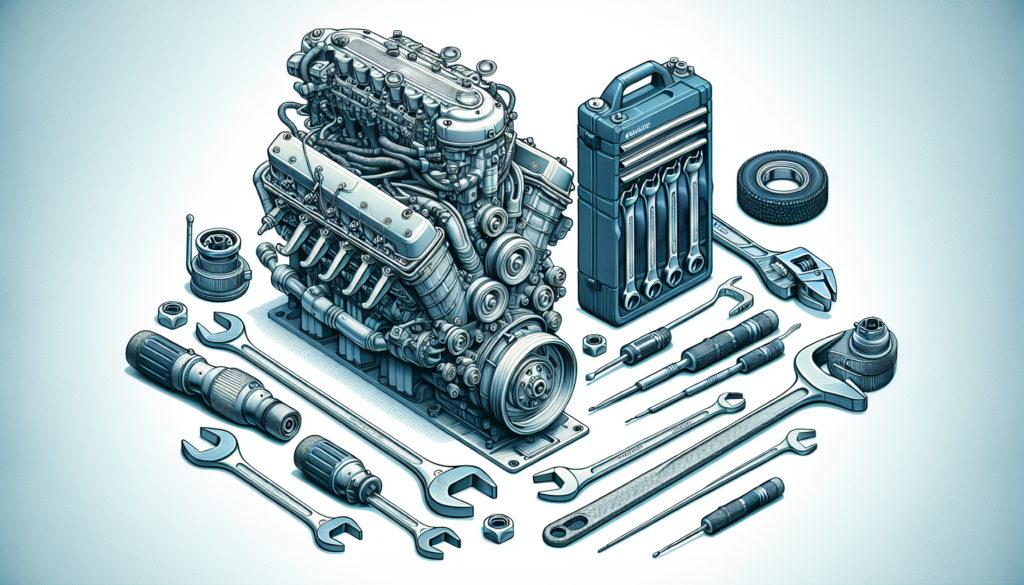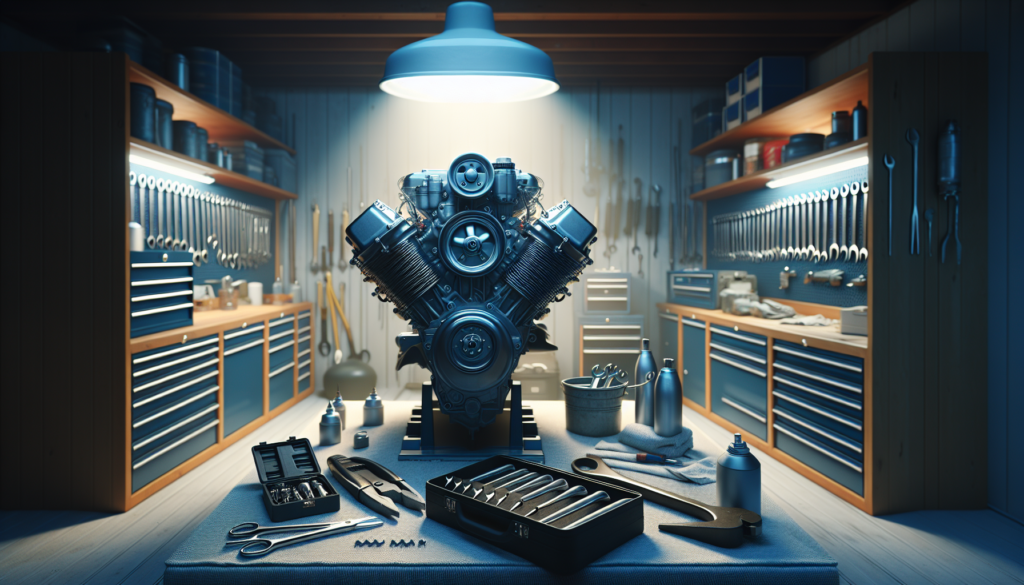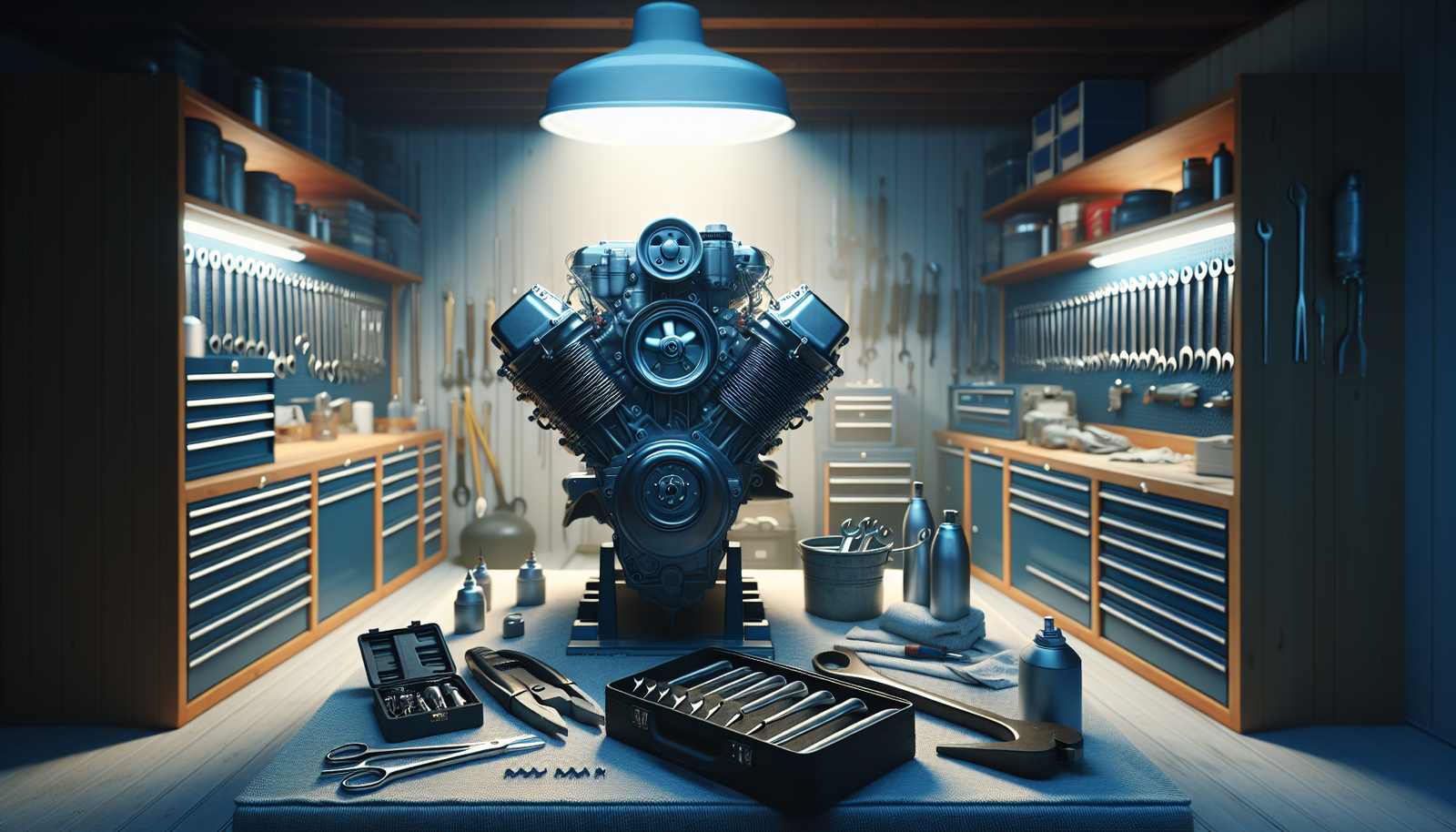You’ve invested a considerable deal in your boat, and there’s nothing quite like the freedom and joy it offers when everything is running smoothly. However, the performance and longevity of your seafaring pride and joy heavily depend on one often-neglected aspect – regular engine maintenance. “The Best Boat Engine Maintenance Schedule for Optimal Performance” provides a comprehensive roadmap to maintain your boat’s engine at its peak level. From essential daily checks to elaborate annual tasks, the guide lists down a detailed routine to help ensure that your aquatic journeys remain uninterrupted by mechanical issues. Comprehensive but easy to follow, this guide is an invaluable resource for both seasoned sailors and novice skippers alike.

Understanding Different Types of Boat Engines
Choosing the right boat motor is just as important as selecting the boat itself. The type of engine you choose will largely depend on your boating needs and preferences. Let’s go through the different types of boat engines so you can make an informed decision.
Gasoline Inboard Engines
First up are gasoline inboard engines. They’re called “inboards” because they’re installed inside the boat’s hull. They generate power through internal combustion, providing a lot of horsepower. Gasoline inboards are great for speed and can handle bigger boats. However, they also consume more fuel and require more maintenance than other types.
Outboard Engines
Outboard engines, on the other hand, are mounted outside the boat’s hull. They’re popular because they’re simple to operate, easy to maintain and incredibly versatile. You’ll find outboard engines on everything from small fishing boats to larger cruising boats. They allow for easier steering and maneuvering but their position exposed to water can lead to corrosion.
Diesel Inboard Engines
There’s also a choice between gasoline and diesel for inboard engines. Diesel inboards offer more fuel efficiency and lifespan than their gasoline counterparts, which can save you money in the long run. But upfront, they tend to be more expensive and not as fast.
Sterndrive Engines
Sterndrive engines, or inboard/outboards as they are sometimes called, are a hybrid of both mentioned before. Part of the engine is inside the boat, while the drive unit is outside. The advantage here is they offer the power of an inboard with the maneuverability of an outboard. But they are complex engines that often require professional maintenance.
Jet Propulsion Engines
Finally, there are jet propulsion engines. Instead of a propeller, these draw in water, compress it, and then eject it out the back, propelling the boat forward. This makes them very safe as there’s no risk of propeller accidents. However, they tend to be less fuel-efficient and aren’t as sensitive to subtle speed or direction changes.
Benefits and Drawbacks of Each Engine Type
Each engine-type has its own pros and cons. Gasoline inboards have excellent power but consume a lot of fuel. Outboards are easy to maintain but can corrode with exposure. Diesel engines are efficient but slow, while a sterndrive engine requires professional maintenance. Jet propulsion engines might be safe but less fuel-efficient and precise. Weighing these variables against your needs will help you make an informed choice.
Knowing Your Boat Engine
Just like your car or bicycle, a good grasp of the basics of your engine is key to its proper maintenance. This helps you comprehend what’s happening under the hood and lets you spot issues before they become problems.
Understanding Engine Specifications
Knowing your engine’s specifications is important. This involves understanding the horsepower, displacement, number of cylinders, and more. These specs will affect how the engine performs including its speed, acceleration and fuel usage. It’s like getting to know the heart of your boat.
Reading and Understanding Your Engine Manual
Your engine manual is your best friend when it comes to understanding your boat engine. It will break down all the parts of your engine, how it works and how to maintain it. Make a habit to regularly read and refer to it.
Identifying Common Engine Parts
Knowing your engine means familiarizing yourself with its common parts and components. From the spark plugs and distributor cap to the cooling and fuel systems. This knowledge will equip you to perform routine checks and maintenance tasks.
Role and Function of Each Part
Each part of the engine plays a role in its overall function. Realizing how these parts work together lets you grasp why and when maintenance is necessary and what each maintenance action does for your engine.
Importance of Regular Boat Engine Maintenance
Regular engine maintenance can make the difference between a joyous day sailing on the water and being unexpectedly stuck. Let’s look at why it’s so crucial.
Enhancing Engine Performance
Well-maintained engines function optimally, providing you with better speed, power, and efficiency.
Reducing Fuel Consumption
Efficient engines consume less fuel. Along with being cost-effective, this is also better for the environment.
Preventing Costly Repairs
Maintenance allows for early problem detection and fixing, preventing minor issues from escalating into major, costly repairs.
Increasing Service Life of the Engine
With regular upkeep, your engine will simply last longer. This adds to your boat’s lifespan and maintains its value well.
Improving Safety on the Water
Your safety on the water relies mainly on your engine. Regular maintenance reduces the chances of malfunctions or breakdowns that might put you or your passengers at risk.

Daily Maintenance Routines
You need to establish daily routines for your boat engine maintenance. These tasks are simple to perform and don’t take up a lot of time.
Check Fluid Levels
Every single day, check your engine’s oil and coolant levels. It’s a simple task that greatly contributes to detecting any leaks or issues in the system.
Inspect for Visible Damage or Leaks
Take a look all around the engine for any visible signs of damage or leakage. Pay particular attention to the seals and gaskets.
Battery Check
The battery is the power source for your boat’s electrical system. Daily checks on the battery’s charge and connections can save you from many inconveniences.
Ensure The Bilge is Clean and Dry
The bilge, located at the bottom of the boat, can collect excess water or fluid leaks. A clean, dry bilge prevents any damage that might be caused by stagnant water.
Test the Engine Cut-Off Switch
This switch is a safety feature that shuts off the engine when activated. It is important to make sure that it works correctly to ensure safety while operating your boat.
Weekly or Bi-weekly Maintenance Tasks
Along with daily tasks, there are those that need to be performed either weekly or bi-weekly.
Clean Engine Exterior
Cleaning the exterior of the engine helps prevent the accumulation of grime and rust. Something as simple as wiping down the motor can do much to extend its lifespan.
Examine Fuel System
A regular inspection of the fuel system, including the fuel lines and tank, can detect any leaks, cracks, or clogs which could heavily affect your engine’s performance.
Monitor Engine and Transmission Oil
Even though you’ll check the oil levels daily, a more in-depth look at the state of the oil should be done regularly. Look out for signs of contamination and change oil if necessary.
Check the Coolant Level
Make sure that your cooling system is adequately filled. Overheating can lead to serious engine damage.
Inspect Belts, Cables, and Hoses
These important components handle a lot of tension and stress. Inspection of their condition can uncover any wear and tear before it leads to significant issues.
Monthly Boat Engine Maintenance
To preserve the performance and lifespan of your boat engine, some parts need to be addressed every month.
Clean Air Filter
A clean air filter ensures a steady flow of air into the combustion chamber, assisting the overall engine performance. Dust and contaminants could affect this flow, leading to issues with fuel economy and even engine damage.
Examine and Clean Spark Plugs
Spark plugs are integral for your engine’s operation, igniting the fuel-air mixture and helping your boat to start. Regular cleaning can extend their lifespan and performance significantly.
Check the Propeller
As the driver of your boat, the propeller should be in top shape for your engine to deliver optimal performance. Check for any damage or debris that might impair its function.
Check the Fuel Filter and Replace if Necessary
The fuel filter prevents dirt and debris from entering your engine. A clogged or dirty filter can restrict fuel flow, affecting engine performance. Regular checking and replacement is needed.
Check for Corrosion and Treat if Found
A quick check for any corrosion or rust on the engine or its components can prevent serious damage. Corrosion can swiftly spread, damaging integral parts, thus immediate treatment is essential.
Seasonal Boat Engine Maintenance
Seasonal changes, especially the transition between boating and non-boating seasons, present an important opportunity for particular engine tune-ups.
Change Out Engine Oil and Filter
Regardless of usage, engine oil degrades over time. Changing the oil and filter, usually before winterizing and again when commissioning, helps ensure optimal performance.
Servicing the Cooling System
Before long periods of inactivity, it’s a good idea to flush the cooling system and fill it with antifreeze.
Inspect and Service Drive Belts
Drive belts can crack and wear out over time. Inspecting them and replacing when necessary helps prevent unexpected breakdowns.
Check and Replace Distributor Cap if Necessary
Even if it seems fine from the outside, the distributor cap may have cracks on the inside, leading to engine misfire. Seasonal checks can prevent potential issues.
Inspect and Replace the Impeller if Necessary
The impeller helps with engine cooling. It’s often made of rubber and can deteriorate when not in use. Checking and replacing it when necessary can prevent engine overheating.
Annual Boat Engine Maintenance Tasks
On top of daily, weekly, monthly, and seasonal routines, there are also a number of tasks you should commit to on an annual basis.
Replace Spark Plugs
While you must check your spark plugs regularly, they should be replaced at least once a year to ensure optimal performance.
Change the Fuel Filter
Like the spark plugs, your fuel filter should be replaced annually. Regular replacement ensures a smooth and clean fuel flow into your engine.
Service Drives and Props
The drives and props of your boat take quite a beating throughout the year. An annual check-up and possible repair and replacement can prevent serious damages.
Inspect the Ignition System
The ignition system is a crucial part of your engine. Checking all its components, from ignition coils to spark plug wires, should be a part of your yearly maintenance tasks.
Check and Replace the Timing Belt if Necessary
The timing belt helps synchronize many critical engine functions. Should it fail, it could lead to heavy engine damage. Regular checks and replacements can drastically decrease this risk.
Record Keeping for Boat Engine Maintenance
Maintaining accurate records of servicing and repairs on your boat engine is just as important as doing the actual maintenance.
Importance of Maintaining a Log
Keeping a detailed log of all maintenance tasks gives you a clear overview of what has been done and when. This allows for timely reminders of what needs to be done next.
Recording Completed Maintenance Tasks
Recording each task once completed allows for real-time tracking of your engine’s state. This information might come handy should you encounter any issues in the future.
Keeping Track of Engine Performance Issues and Related Repairs
By recording past performance issues and the steps taken to address them, you maintain an invaluable resource that can help diagnose and solve future problems.
Using Records to Predict Future Maintenance
A well-kept log helps you anticipate upcoming maintenance needs and tasks based on the past history of your boat engine.
Organizing Digital and Physical Records
Whether your records are digital or physical, ensure that they are well-organized and easily accessible. This will save you time and confusion in the long run.
When to Seek Professional Help
Boat engine maintenance is a combination of DIY tasks and ones requiring professional skills. Recognizing when to seek expert help can save you time, money, and ensure your boat runs smoothly.
Identifying Maintenance Tasks Beyond Your Skill Level
There will be maintenance tasks that exceed your skill or comfort level. Attempting to carry them out yourself may result in damage or complications. Admitting what’s beyond your scope and seeking professional help is wise in such cases.
Recognizing Signs of Serious Engine Trouble
While you can address some engine issues yourself, others signal serious trouble. If your engine is overheating, using excessive oil or fuel, making unusual sounds or vibrations, or performing poorly, you should get professional help promptly.
Finding a Trusted Marine Mechanic or Service Center
Having a trusted professional to turn to when you require expert assistance provides peace of mind. Find out who the reputable marine mechanics or service centers are in your area and establish a relationship with them before you need their services.
Understanding the Costs and Benefits of Professional Maintenance
Professional help does come at a cost. But this expense is a long-term investment in your boat’s value and performance, and should be factored into your annual boating budget.
Remember, the best boat is a well-taken-care-of boat. By understanding your boat engine and maintaining a regimen of daily, weekly, monthly, and seasonal engine care, you will not only extend the lifetime of your boat but also enhance your boating experience. After all, maintenance is but a small price to pay for the joy and freedom of sailing the open waters.

